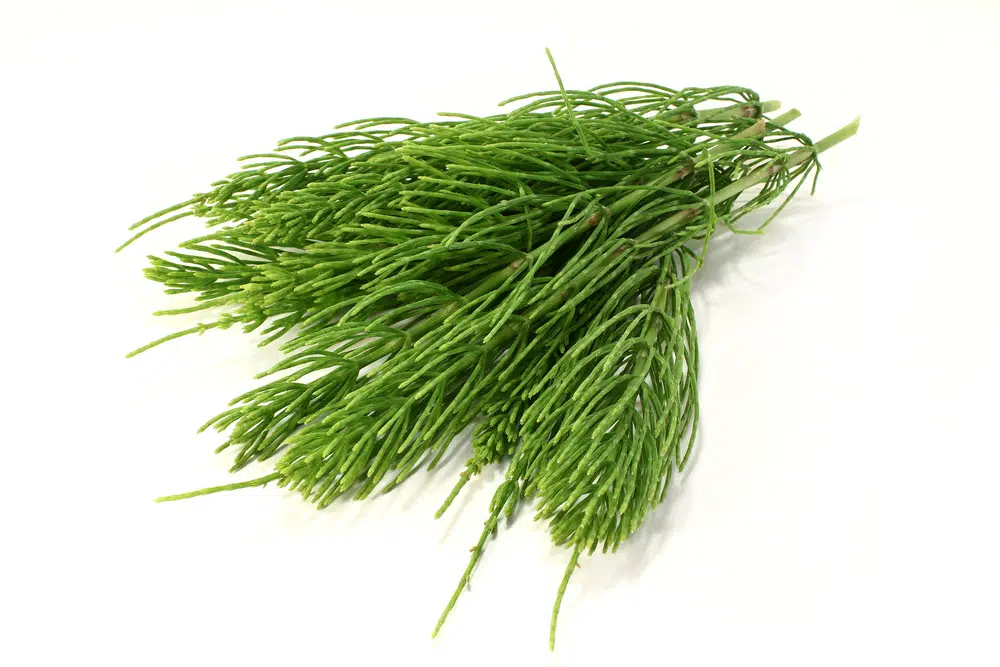Introduction
Horsetail (Equisetum arvense) is a perennial herb that has been used in traditional medicine for centuries. Known for its unique appearance resembling the tail of a horse, this plant belongs to one of the oldest families of plants on Earth, dating back to the time of the dinosaurs. It is highly regarded for its medicinal properties, primarily due to its rich silica content and various other bioactive compounds. This guide explores the benefits, uses, and potential side effects of horsetail, providing a detailed look at how this ancient herb can be incorporated into modern health practices.
Overview of Horsetail
Horsetail grows abundantly in North America, Europe, Asia, and the Middle East. It thrives in wet areas, making it common along riverbanks and meadows. The plant is characterized by its thin, green, bamboo-like stems and cone-shaped fruiting heads. Traditionally, it has been used for its diuretic properties, ability to speed up wound healing, and support for bone health.
Composition of Horsetail
Horsetail is primarily known for its high silica content, which is crucial for bone and tissue health. The herb also contains several antioxidants, including flavonoids and phenolic acids, which protect against cellular damage and support overall health. Additionally, it provides small amounts of several vitamins and minerals, including potassium, manganese, and magnesium.
Health Benefits of Horsetail
Supports Bone Health
One of the most celebrated benefits of horsetail is its ability to support bone health. The silica in horsetail helps to form collagen, an essential protein found in bones, skin, and connective tissue. This can be particularly beneficial in conditions like osteoporosis and can aid in the healing of fractures.
Diuretic Effect
Horsetail has natural diuretic properties, which can help increase urine output and thereby aid in detoxification and the flushing out of bacteria from the urinary tract. This makes it useful in preventing and treating urinary tract infections (UTIs) and kidney stones.
Antioxidant Properties
The antioxidants in horsetail, such as flavonoids and phenolic acids, help combat oxidative stress, a factor in many chronic diseases including heart disease and type 2 diabetes. These compounds can neutralize harmful free radicals, thereby protecting cells and tissues from damage.
Skin Health
Horsetail’s high silica content also benefits the skin by promoting the synthesis of collagen, improving skin texture and elasticity, reducing inflammation, and aiding in the healing of wounds and burns.
Hair and Nail Health
Anecdotal evidence suggests that horsetail can strengthen hair and nails, largely due to its silica content. This mineral helps improve the sheen and strength of hair and may contribute to faster nail growth and improved nail strength.
Supports Kidney and Bladder Health
As a natural diuretic, horsetail can help maintain kidney health by increasing urine output and thus reducing the load on the kidneys. It may also help manage conditions like edema by promoting fluid drainage from the body.
Uses of Horsetail
Horsetail can be used in various forms, including teas, capsules, tinctures, and topical solutions. Here’s how horsetail is commonly used:
Tea
Dried horsetail can be steeped in boiling water to make a herbal tea, which is commonly consumed for its diuretic and bone-health benefits.
Supplements
Horsetail is available in capsule or tablet form, often used for its convenience and concentrated dose.
Topical applications
Horsetail extracts are sometimes included in creams and ointments for skin and hair care products.
Potential Side Effects and Precautions
While horsetail is safe for most people when used appropriately, it can cause side effects, particularly if overused or used improperly.
Thiamine Deficiency
Horsetail contains an enzyme that can break down thiamine, potentially leading to a deficiency if consumed in large quantities over a long period.
Diuretic Effects
Excessive use of horsetail could lead to dehydration and electrolyte imbalances due to its diuretic properties.
Pregnancy and Breastfeeding
There is insufficient research on the safety of horsetail during pregnancy and breastfeeding, so it is best avoided during these times.
Interactions with Medications
Horsetail could interact with diuretics and medications for diabetes and can also affect lithium levels, necessitating caution.
FAQs
How often should I drink horsetail tea?
It’s generally safe to drink horsetail tea once a day. However, due to its diuretic effects, it should not be consumed in excessive amounts.
Can horsetail help with weight loss?
While horsetail’s diuretic effect can reduce water weight, there is no direct evidence that it aids in long-term weight loss.
Is horsetail safe for children?
Due to limited research on its effects in children, it’s best to consult a healthcare provider before giving horsetail to a child.
How long does it take for horsetail to improve hair and nails?
Improvements in hair and nail strength and growth may be noticed after a few months of consistent use.
Can I use horsetail if I have diabetes?
Because horsetail can lower blood sugar levels, it should be used with caution by those managing diabetes, preferably under medical supervision.
Are there any foods or supplements I should avoid when taking horsetail?
Avoid other diuretics to prevent dehydration and electrolyte imbalances. Also, be mindful of combining horsetail with supplements that can affect blood sugar levels.
Where can I buy horsetail?
Horsetail can be found at health food stores, pharmacies, and online retailers that sell herbal supplements.
Conclusion
Horsetail offers numerous health benefits, particularly related to bone, skin, and urinary tract health due to its high silica content and diuretic properties. However, as with any supplement, it should be used with caution to avoid potential side effects. Always consult a healthcare provider before starting any new treatment regimen, especially if you have existing health conditions or are taking other medications. With the right approach, horsetail can be a valuable addition to your health and wellness routine.

